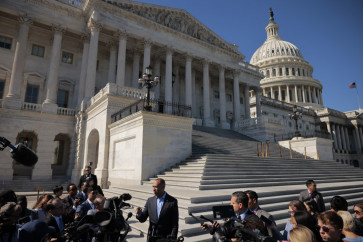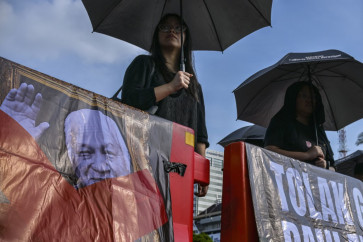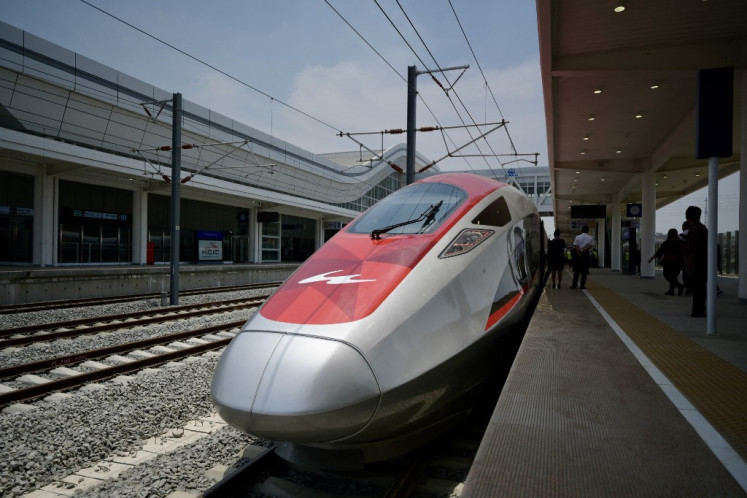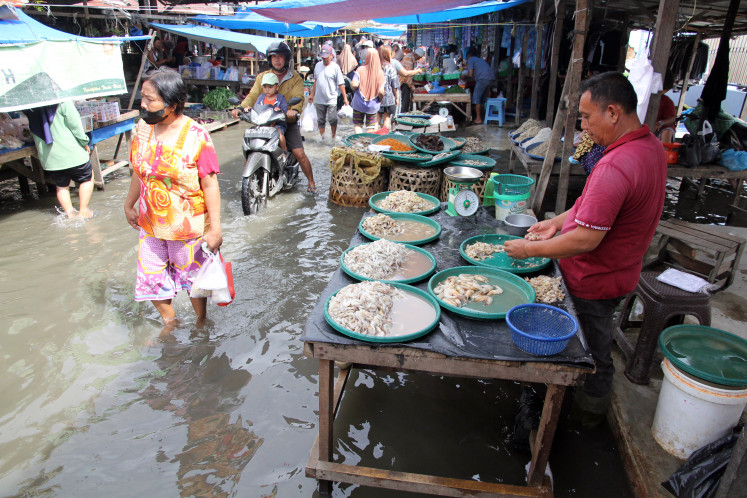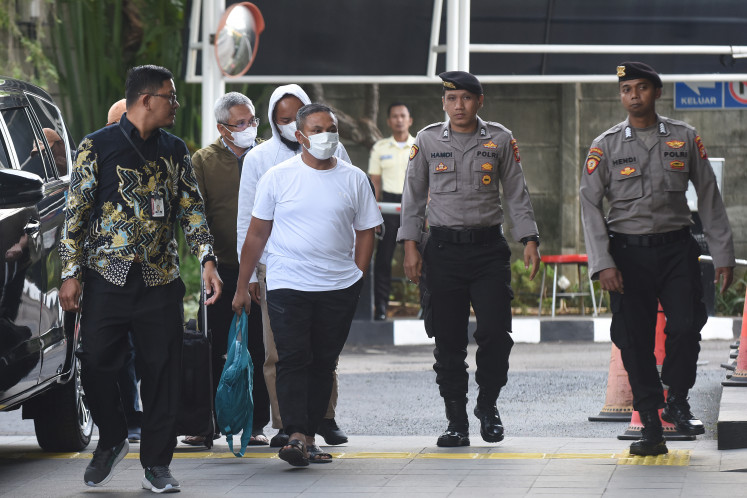Popular Reads
Top Results
Can't find what you're looking for?
View all search resultsPopular Reads
Top Results
Can't find what you're looking for?
View all search resultsCommunity partnership: Keeping Nyambu authentic, natural as ecotourism village
Group discussion: The participants of Active Citizens reflect on their journey on implementing Social Action Projects in their communities during a workshop in Bali
Change text size
Gift Premium Articles
to Anyone
G
roup discussion: The participants of Active Citizens reflect on their journey on implementing Social Action Projects in their communities during a workshop in Bali.(Courtesy of British Council)
Positive changes have started to take place in Nyambu ecotourism village following efforts by the British Council in partnership with Diageo Indonesia and Yayasan Wisnu to unleash local potential.
Community-based Desa Wisata Ekologis (DWE) Nyambu or Nyambu ecotourism village in Tabanan, Bali is witnessing positive changes as part of the village’s journey, with authenticity becoming its increasingly preferred hallmark.
Officially opening its doors to the public in 2016, Nyambu village with its paddy-fields, relief temples and other tourist attractions that local young people surprisingly found through their cultural mapping project three years ago, have started to lure eco-conscious travelers.
Nyambu village with a population of 3,400 people, 30 percent of whom are young people, had yet to realize its huge potential until the ecotourism program was introduced in 2015. The assets, which in the past were useful mainly for locals according to the respective function, are now also meaningful to others, including those from far and wide beyond Bali.
Visitors to the village shared the joy of being in the village, which many eco-conscious people consider a rare but highly respected site thanks to its maintained authenticity in an era marked by a technology driven, rapidly changing environment.
“Nyambu is the authentic Bali. Great people in love with their village and their culture and also who love to share the history and values,” Simon Verdebout from France told The Jakarta Post recently.
Rice field trails, cultural trails and village bicycle tours are among spiritual life-enriching things to do on offer at Nyambu village. “All activities are enjoyable. Simply because we are accompanied by passionate people who love sharing and sharing,” said Verdebout who visited Nyambu with his wife and children in April.
Melinda Instellar, contacted separately, said she came to Nyambu village recently as a traveler who also conducted research on ecotourism for her thesis. “Nyambu has its own appeal. It is a non-mass-oriented tourist destination that can retain its quality and authenticity, allowing visitors to taste the originality of Nyambu village as it is,” said Melinda, who enjoyed a rice field trail and a cultural trail.
Meaningful memories
The natural Nyambu home, several of which have spacious gardens with nice shady trees, is also a child-friendly area, at least that’s what Soyeonpark Park, a mother of two from Gwangmyeong-si, Gyeonggi-do, South Korea, said.
“My first daughter goes to elementary school this year so I want to show foreign culture and introduce the local Balinese life,” said Syeonpark who, along with her children visited Nyambu in September.
“What if we stayed only at a resort, it could be the same as in Korea. I desire to give my daughters special and meaningful memories,” she noted. “My daughters can have another grandma and grandpa in Bali. While we stayed in a homestay, we felt like being at a grandparent’s house. Hojung, my daughter, says that the most memorable thing in Bali is Ebujero grandma’s house,” she added.
“They played freely running across the big beautiful garden and yelling ‘ants […] ants’. She always smiled at them like their real grandma,” she said.
Nyambu with its natural and cultural appeal has also enthralled Jinpa Smith, a freelance journalist from Germany, who also came to the village to find out more about ecotourism in Bali. “I enjoyed the cultural trail as I am a Buddhist and I really enjoy hearing the stories about how Hinduism came to Bali,” said Jinpa who visited Nyambu in September.
She went on to say, “Satya [her guide] showed me the stone reliefs and told me the stories — it was very interesting. I also enjoyed seeing the rice fields and the monkey shrine and bathing pool!” she said.
More eco-conscious visitors will pleasurably share their Nyambu village experience, but the intriguing question is how the sought-after ecotourism village could have impacted on the locals.
The British Council’s director of education and society Ian Robinson attributed the development of the Nyambu ecotourism village to the change that has taken place following the Social Enterprise (SE) and Active Citizens training program that the British Council and its partners, Diageo Indonesia and Yayasan Wisnu, provided for local young people.
Yayasan Wisnu is an organization that focuses on ecotourism development in Bali.
“The program has changed the capability and expectation of local people. It opened the opportunity for them to manage their own potential,” he said.
The change has occurred in both the village for the local people and in wider Bali, and with local regent support and interest in the wider area beyond Nyambu.
The British Council has helped create a more secure, prosperous and inclusive society by enabling communities to embrace social and creative entrepreneurship in partnership with local and regional partners, Robinson said.
The United Kingdom has a long history of civil society, cooperative and SE work. “We are committed to sharing our experience, and expertise, developing new models with partner countries,” he said.
“We are interested in working with other countries in ways that are mutually beneficial and can help the sector in both Indonesia and the UK develop through partnership and sharing of new models,” he added.
Diageo Indonesia’s corporate relations director Dendy Borman said the local community had given great support to the program, which “I think is a significant change”
“Nyambu village looks cleaner, which demonstrates the local community’s consistent commitment to reduce plastic trash,” he said.
Active Citizens training and Social Action Project Showcase has helped enhance local ecotourism village players’ confidence in developing Nyambu village into a better ecotourism village.
Along with the British Council, Diageo provides what local human resources need to develop Nyambu ecotourism village, such as funding, networking, best practice reference and feedback.
Training approaches
It started with community-based SE support and competitions to map where they were, after which “we provide mentoring and capacity building, to SE across Indonesia. Then we took these training approaches and materials and applied them, in a specific community in which Diageo worked,” Robinson explained.
Local young people were engaged in implementing the cultural mapping projects as part of their efforts to unlock local potentials, the result of which was the findings related to 57 temples, 22 springs and 61 percent of its 384.7 hectare rice fields, which travellers can now enjoy.
Thanks to the Nyambu ecotourism village development program, local administrations at the regency, provincial and central level have started to pay heed to the village. “An 8 km-long road in the village, for example, has been repaired. Local people have been waiting for this for 15 years,” said Denik Purwati, director of Yayasan Wisnu, local partner based in Bali that mentors and support Nyambu to develop the DWE Nyambu.
Nyambu ecotourism village has also provided opportunities for local people, especially those who own homes with extra rooms. “They started to clean and improve the room and submit it to the DWE Nyambu operator that will manage it as a lodging,” she said.
To date, 10 rooms are readily available and “the rooms have frequently received guests,” she said.
The DWE Nyambu has also had an impact on local young people as the long-term backbone of the program. “Many of them have restored their self-confidence and love their village more,” she said.
In the past, Nyambu people felt ashamed of admitting where they were from but “now they are proud of being people from Nyambu. This can be seen from what local young people say through social media,” she said.
What would be the next plan in relation with Nyambu ecotourism village?
“At the minute, we are completing impact evaluation assessments in Nyambu and considering the next steps. We will share the Nyambu experience internationally in the British Council’s Active Citizens program globally in February next year.”
Participants will learn about the journey that Nyambu is taking. “This is being organized after having had a successful Active Citizen National Showcase in September, with examples from across Indonesia,” he said.
The positive changes taking place in Nyambu village can be a good and encouraging start for local ecotourism village development, but another intriguing question is on how to ensure the sustainability of the program.
“Strong commitment from the Nyambu village community is, absolutely, the main factor to make the DWE Nyambu sustainable,” Dendy said.
_______________________
Partners for Change
This page is produced by The Jakarta Post in cooperation with CCPHI Partnership for Sustainable Community. It promotes best practices in community partnerships. For more information, contact the Supplements & Supplemental Products section at supplement@thejakartapost.com.



